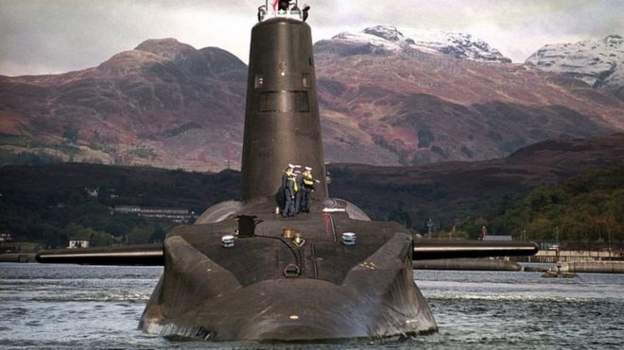Labour leader suggests possible solution to protect defence jobs and maintain stance on unilateral disarmament
Jeremy Corbyn has raised the prospect of replacing Trident submarines with those without nuclear warheads in a move that would keep defence jobs in
Scotland and Cumbria and maintain his proposed policy of unilateral disarmament.
The Labour leader made the comments after launching a review of the party’s
Trident policy to be led by Emily Thornberry, the shadow defence secretary, amid divisions within the party over the potential renewal of the UK’s nuclear defence.
Corbyn, who opposes nuclear weapons, has said he wants to “accommodate” those who want to keep Trident submarines, including the trade unions representing defence workers and more than half of his shadow cabinet.
In an interview over the weekend, the
Labour leader argued there was not a binary decision on whether to replace them, suggesting a possible compromise that supports defence jobs.
Pressed on the BBC’s Andrew Marr Show what this meant for Trident, Corbyn said: “They don’t have to have nuclear warheads on them.”
Asked again whether he was suggesting that new submarines could be built to be used without nuclear warheads, Corbyn said: “There are options there. The paper that Emily Thornberry has put forward is very interesting and deserves study of it. I hope there will be a serious and mature response.”
He also stressed that he would want to maintain employment for people in the defence industry who would be involved in building Trident submarines as a “first priority”.
Labour MPs will have to make a decision over whether they support or oppose Trident before a parliamentary vote in the spring on whether the nuclear submarines should be replaced.
Given that Corbyn cannot officially change policy to oppose Trident before conference in the autumn, it is looking increasingly likely that he will offer his party a free vote.
Len McCluskey, the general secretary of the Unite union, told Sky’s Murnaghan programme it would be “sensible” for Corbyn to let MPs vote freely and suggested he could be open to the idea of submarines with no nuclear weapons on them.
“There’s all kind of different options that will be debated and discussed,” McCluskey said.
He said the decision on proceeding with building the nuclear submarines would go through in parliament but defence diversification would be discussed after that as part of Labour’s review.
Thornberry, who replaced the pro-Trident Maria Eagle as defence secretary in the Labour reshuffle, said her review would be serious and and ask far-reaching questions.
Asked what she thought about the idea of replacing Trident submarines without nuclear warheads, she told Murnaghan: “The first thing I would say is calm down ... The defence review was launched on Friday. We need to start with what are the current threats. Our overwhelming priority is to make sure Britain is safe. We need to make sure we have policies that address 21st-century threats, not 20th-century threats.”
Thornberry also said there was a “debate to be had about how many jobs are specifically related to the renewal of Trident”.
She avoided the question about why Ken Livingstone, the former mayor of London, has been sidelined from her defence review but made clear she was now in charge.

